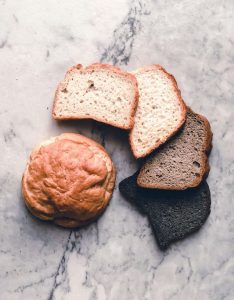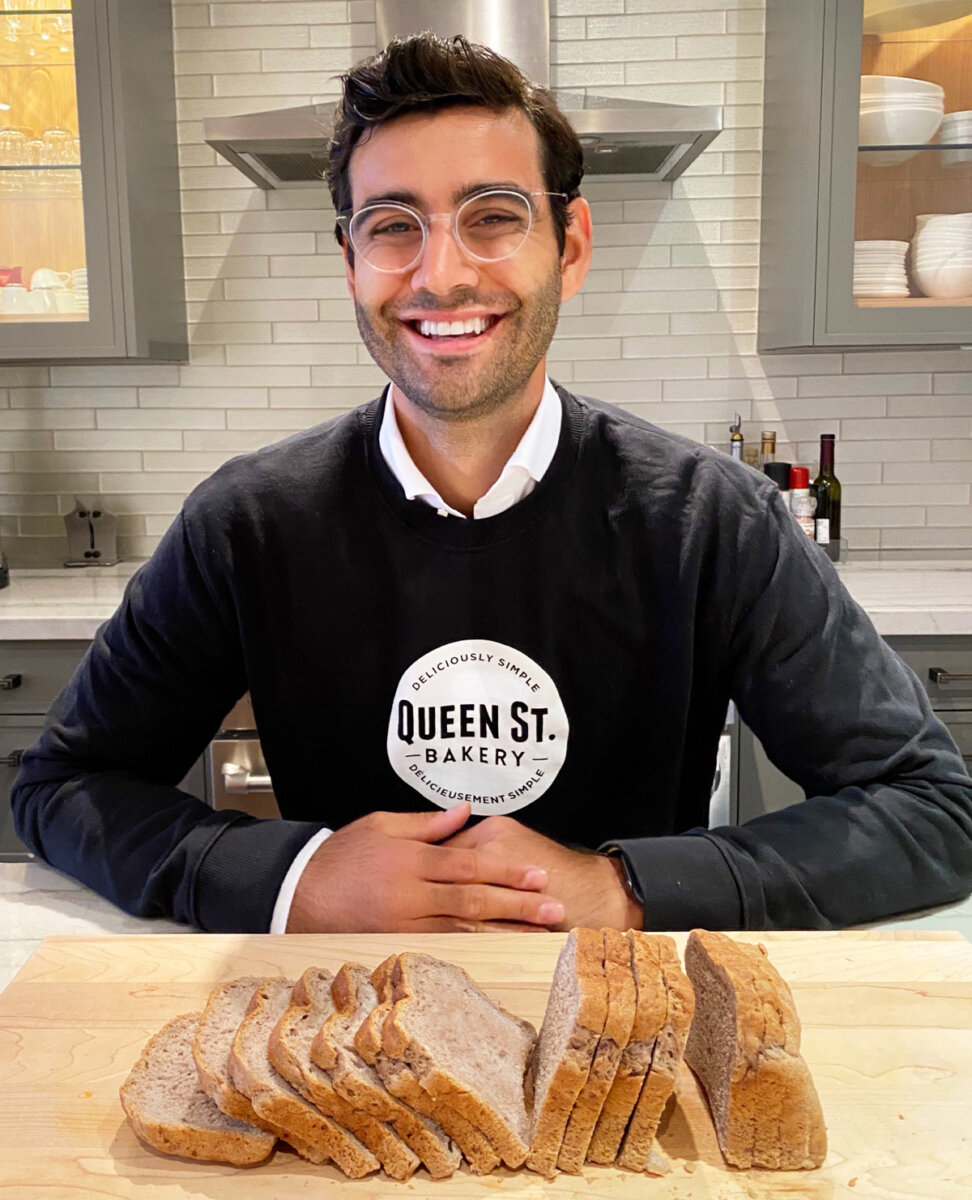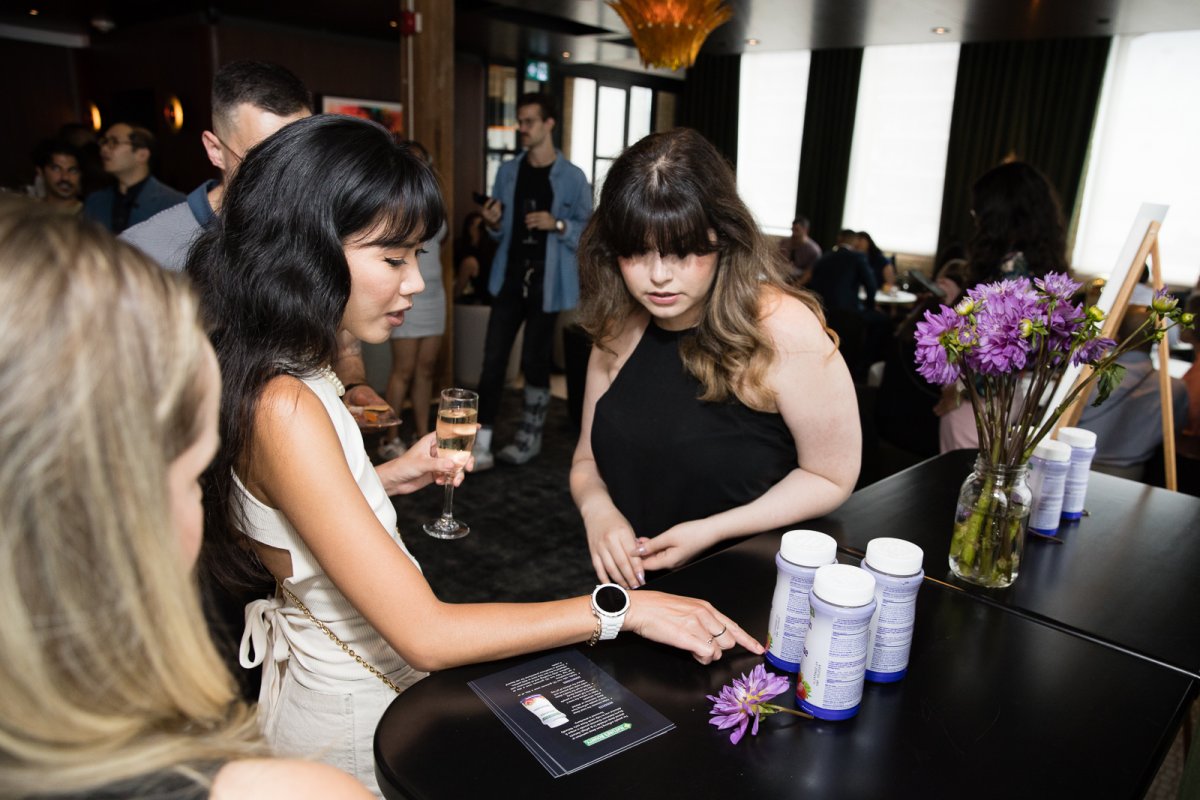[vc_row][vc_column][vc_column_text]Imagine a bread that’s low calorie, low carbs and allergen-free. Queen St. Bakery has made it a reality.
Inspired by his mom’s gluten intolerance, Queen St. Bakery founder, Giovanni Angelucci, set out to create an allergen-free bread that even those without dietary restrictions would want to eat. Two years and hundreds of taste tests later, Angelucci and his team crafted a handful of winning recipes that they’re confident any bread-lover would be satisfied with.
Queen St. Bakery products are created with either chia or bean flour, which allows them to be enjoyed by a wide consumer base, and creates options for those who are otherwise limited. For Angelucci, receiving customer feedback is the highlight of his day.
“There was a direct message we got the other day that was like, ‘I thought we’d never eat pizza again. My husband loves pizza but was diagnosed with celiac disease; we discovered your pizza dough and it’s changed our life,’” he said. “I really didn’t think we could be this impactful. We’re not saving lives, but to some people, maybe it feels that way.”
However, getting Queen St. Bakery to this point didn’t come without its challenges. Angelucci said that while trying to grow the company, a trusted business operator was caught mismanaging funds. After parting ways with the operator, Angelucci was back at square one. Left with the business, but no operator and no cash, he had to ask himself, “Where do we go from here?”
He credits the support of family and dedicated employees, “right down to the baking staff who put in the hours every day,” that kept him going and helped push the company forward.
Now, Queen St. Bakery is available in approximately 1000 distribution points across Canada. With a recent partnership with District Ventures Capital, Angelucci and the Queen St. Bakery team have their sights set on going international.
Angelucci credits himself as an entrepreneur at heart, and with Queen St. Bakery, he has seemed to find his stride. Only two years after its conception, and the company has managed to win-over the hearts of bread-lovers throughout the country.
For this week’s Start-Up Spotlight, Bay Street Bull spoke with Queen St. Bakery founder, Giovanni Angelucci, about filling a gap in the market, the importance of picking the right people to work with and changing the bread game.[/vc_column_text][vc_text_separator title=”Q&A” color=”custom” style=”double” border_width=”3″ accent_color=”#a80000″][vc_single_image image=”19426″ img_size=”full”][vc_column_text]What sparked your interest in creating a bread that was gluten-free and allergen friendly?
For one, my mom is gluten intolerant and I’ve seen her try every option out there. I had also tried every option at the time, and I would never have eaten those by choice, but I love bread. I love traditional gluten products: pasta, pizza and bread, and I’m a first generation immigrant, so I’ve made this stuff my whole life. I knew what was in the bread [available in the market], versus what has to be in bread, and there was a big disconnect—there were far more ingredients than you need to have. So we said, ‘Let’s take this back to its basics and make something that tastes and feels great and gives people what they want.’ And I knew it was doable. I had to prove it to myself and we did, that’s how the product was created.
What was the experience of developing all the recipes for the different types of loaves?
Thank goodness it’s low calorie, low carb and filled with good ingredients, because you do a lot of taste testing. I’m not the baker or the expert, Conrad is, but we all provide our little tidbits of ‘Add a little this, add a little of that.’ After a couple of hundred iterations, you’re like, ‘Wait, I think we’ve got one.’ And it’s sample 112. So, a lot of trials.
When you think back to the beginning of wanting to make bread that your mom could enjoy, to now being in over a thousand grocery stores Canada-wide, what are your thoughts?
I was looking at it today for a customer: we’re in BC, we’re in PEI, we’re in two stores in Whitehorse. If you had asked me a year ago, do you think you’d get here? I would say, ‘Yes, it’s possible, but it’s gonna take a lot of hard work and a lot of luck.’ But, we knew it was doable.
If it was a bad product, I would have given up a long time ago, but it was such a good product. You can put lipstick on a pig, but it’s still a pig, as they say. This was not a pig. This was fantastic; we just needed people to know about it. And so that got us through some of the darkest days.
A couple of well-placed trade shows and stuff helped too. When you’re there, the feedback you get is fantastic. And the right DM or the right email from a customer telling us they love the product…those things help a lot. [/vc_column_text][vc_column_text]

It does. For me, getting those [reviews] pushes us through and helps keep us going every single day. And it’s starting to feel like we’re getting that turning point, like there’s a real chance of big success with this. We knew it was possible, but the level of possibility and the chance of success varies. There were some points where it looked very close to zero, and now there’s points where it’s looking much higher than that. So we’re excited.
Queen St. Bakery has had about 2000% growth in distribution over the last few months. Did you face any unique challenges having just hit the stores before the COVID-19 pandemic began?
Oh, all kinds. For one, demonstrations are very important for us. You don’t see a lot of bread ads out there—people have to try it. Nobody is doing or trying anything on demo during a pandemic, right? So that was out the window. And we had hundreds of demos lined up for all of our retail partners across Canada. So that was a big change. Also, we produce our own products. And there was a point when we didn’t know how long the borders would be closed, so we had our suppliers bring in six months worth of product. We committed to the product before we knew we’d even be able to make or sell it because we knew that, that’s an easier problem to fix rather than not having the product and being empty on the shelves. Another challenge was that all of these retailers moved to online shopping so quickly. People would search the tag for gluten free, dairy free or even Queen St. Bakery and we wouldn’t pop up. We had to work through those challenges, so that as people were buying online, they could see our product.
Luckily our production facility was up to par and a lot of what you have to do in a pandemic, we already did. Masks, hand-washing, sanitation and those kinds of things were really crucial for us beforehand.
We’ve used the ups and downs and the slowdown to just get better at every little thing. We’ve reached out to customers who have bought before and bolstered our online sales. We also used the slowdown to donate more than we already did, because fundamentally part of our business is for every 10 loaves we sell, we donate one. So, we were donating one for every five loaves we sold in April and May, when there was a spike early on. People were in need, food banks were getting overrun, and so we used to do that to bolster our online sales and our philanthropic parts of the business too. COVID-19 threw everything for a loop, but we did what we could to survive it, to make the best of it.
On a more positive note, not COVID-19 related, Queen St. Bakery was just backed by District Ventures Capital. What are the next steps for that kind of partnership and working with them?
We’re super excited by it. They tried it early, they had interest, they loved the product. We loved the team at District Ventures (DV), and we loved the experience that Arlene has. Also, how much Arlene cares about Canadian entrepreneurs, Canadian food business, and her marketing expertise, which is not my strength.
We did a seed round just to get their feet wet with us, and we’ll do another round sometime in the next couple months to give us a bigger marketing budget. They’re going to lead that as well. Whether they decide to bring other partners in or not is another story, but we want to use that to get into food service, into other retailers, and probably get into the U.S. next year. We’ve been shopping in the U.S., and they’re worse than up here. We think that in the U.S. there’s less choice sometimes from the gluten-free and allergen-free standpoint. So, we’re going to work with DV to help us get our name out there, expand into food service and expand into the U.S.[/vc_column_text][vc_single_image image=”19427″ img_size=”full” add_caption=”yes”][vc_column_text]And while we’re looking at the future, if we look to the past, what has been the biggest lesson you’ve learned throughout the journey of Queen St. Bakery?
You definitely have to learn how to pick the right people and work with people that you like and people that you trust, because you’re going through something together. The dark times and the good times are shared together. With everyone that you work with, you have to trust them to bring 100% into the job every single time and meet back in the middle with their job done. And so, picking the wrong person at the start set us back a year. Since then, I feel like I’ve picked a lot of the right people: Tony (Ayala), Mark (Arvai), Conrad (Hansuld), the folks at DV, the distributors, the brokers and our suppliers are all great people who we want to work with, and we have worked with, and it’s helping us to excel.
What advice would you give to your younger self?
I would say to know yourself truly; truly understand what your passions are. Follow things, but don’t follow them blindly. Give yourself a reasonable fighting chance of doing things successfully. I think you’ll never learn more than you do in an entrepreneurial capacity, but being an entrepreneur doesn’t necessarily mean having to start a business. You can be an entrepreneurial by joining another small business and having a lot of leeway. You can be entrepreneurial even in bigger businesses. If that’s your passion, find a company that will give you the leeway to do that or start one. And if you start one, make sure it fills a real need, a real gap. Give it a shot—if you have ever had an inclination to do it, do it.
And with Queen St. Bakery, where do you hope to see everything in five to 10 years, I know you’ve touched on being in the States, but what else are you thinking?
Five, 10 years out? I’d love to be international. Gluten-free is popular, not just in North America, but in a lot of different countries. I’d love to see our offering at food chains. A&W has done a really great job of marketing a healthier burger; our bun works great as an alternative to the regular bun for people who don’t really want to do a lettuce bun, cause it’s just a piece of lettuce that’s hard to eat with. Our bun is nut-free, allergen-free, and it’s good for you. It’s perfect for that.
We’d also like to branch into more products, there’s no reason that we can’t use our expertise in manufacturing to get into bagels and croissants or breadcrumbs and baguettes. We’d love to bring forward all of the products that you know and love and also continue to experiment. Queen St. Bakery was really ahead of the curve on bean and chia flours, and there’s a whole bunch of other flours that we’re excited to try out and see if we can create new products with.[/vc_column_text][vc_single_image image=”19430″ img_size=”full”][vc_column_text]And is there anything currently in the pipeline that Queen St. Bakery fans can look forward to?
They’re in the future, but they’re definitely in the pipeline. Bagels, breadcrumbs and croissants are things that we should see soon. Potentially a tortilla and pita wraps as well. So yeah, we’re hoping to get those out.
We want to walk before we run. We have a lot of SKUs in stores, and we want to make sure that people know the brand, so that when we release the bagel, it’s one of those, ‘Hey, we want you to put out a bagel and we’re going to go buy it as soon as you put it out.’ Not ‘Here’s a bagel, let me convince you to try it.’ And so right now, it’s about growing the brand and letting people know about why they should support us, why they should buy from us and why the products are good for them.
Out of curiosity, what’s your favourite product out of the line?
Well, if you’re asking ‘healthy me’, the chia classic is a fantastic product. It’s 60 calories, six carbs, four grams of protein, five grams of fibre—give or take a gram or two—with no sugar added. So you can eat a sandwich with it and you don’t feel guilty. So that’s my favourite product from a ‘healthy me’ standpoint. But you know, the cinnamon raisin is a guilty pleasure of mine. Cinnamon raisin toasted with some cream cheese on it is fantastic. The charcoal pizza is really fun too, because you make pizza and it looks like it’s burned, but it’s really just the fact that it’s charcoal. But, I’d probably say the chia classic is my favourite.
Earlier you mentioned Queen St. Bakery’s philanthropic efforts, which can be another way to measure success. So my question for you is how do you define success?
For me, success is happiness in what you do day to day. And if you can achieve that happiness in what you do day to day, you’ll be successful. So if entrepreneurship and starting these businesses allows me to bring great ideas to fruition and be philanthropic, make a bit of money and provide a good work/life balance so I can still see my family and see friends that would be success to me overall.
Success for the business? I won’t consider it successful unless we are hitting all our goals on zero food waste, on philanthropic donation and on creating a profit. If we can do that and be a profitable company, I think it would be wildly successful. That would make me very happy, and to me happiness would be a success.
Stay up to date with Queen St. Bakery products @queenstreetbakery
[/vc_column_text][vc_separator color=”custom” border_width=”3″ accent_color=”#a80000″][/vc_column][/vc_row]













